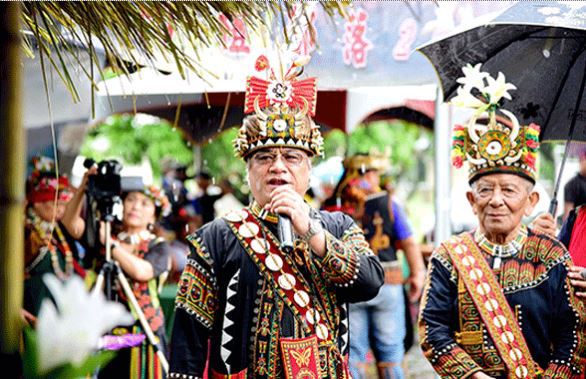Landslides induced by the torrential rains of Typhoon Morakot forced the Ali Tribe of Pingtung to relocate and start afresh in another location. They left the mountains behind to rebuilt on the neighboring plains; however, they did not leave behind their cultural heritage. Every year tribe members get together for the celebration of the Homeyaya (millet festival). This year, the Ali Tribe’s Homeyaya celebration was held with a fair on August 15th and they invited the Jilu Tribe, which also had to relocate their village as a result of the Morakot, to join them for the festivities making it clear that even though they have moved their homes, they have not forgotten their ties to their native villages.This year, staff from the NPUST’s Community Forestry Center and were present for the celebration. The Center, has been a partner with the tribe for many years now, working together with them in the aftermath of the typhoon, and has even received University Social Responsibility Project support from the Ministry of Education for their work.Professor Mei-hui Chen the Department of Forestry has been at the forefront of the work. She explained that “the team from NPUST originally used eco-tourism as a strategy to rebuild the tribal area. Over the years, they have worked to help a number of tribes in the immediate area to rebuild. However, eco-tourism is a tertiary-level industry, and for the tribes to find revitalization, they needed primary and secondary-level industry support. Thus, three years ago, we started the Dawu Tribe “under forest” primary and secondary industry production projects. And in the future, we will continue to expand the influence of the three economic levels, with the Ali Tribe and the Jilu tribe cultivating mushrooms and Chinese medicinal herbs.“Agriculture technology from NPUST has been applied to the cultivation of locally grown native species and the main economic crops of the indigenous villages. From planting seedlings to bringing in the harvest, strategies have been employed to improve overall production capacity in a sustainable way. The natural environment is very suitable for raising bees, which are not only able to produce a unique flavor of honey, but can also keep nature in balance while doing it.”The team from NPUST’s Department of Forestry conducted many meetings with the tribal leaders, carefully studying and discussing the situation and have received strong support from the tribe members. Hopes are that through the Millet Ceremony, tribe members from the area will get to know cultural production value and use traditional knowledge of the environment to maximize the sustainable under forest economic operations.In recent years, young people began recognizing the value of the resources of their local villages, and hopefully more of them will get involved so that the up-coming generation will become culturally aware and identify with their roots. Those involved would also like to see the indigenous people in the mountains those on the plains keep connected with one another as all of these factors will play a part in the rebuilding and reestablishment of the society, ecosystem and sustainable production in the tribal lands.

